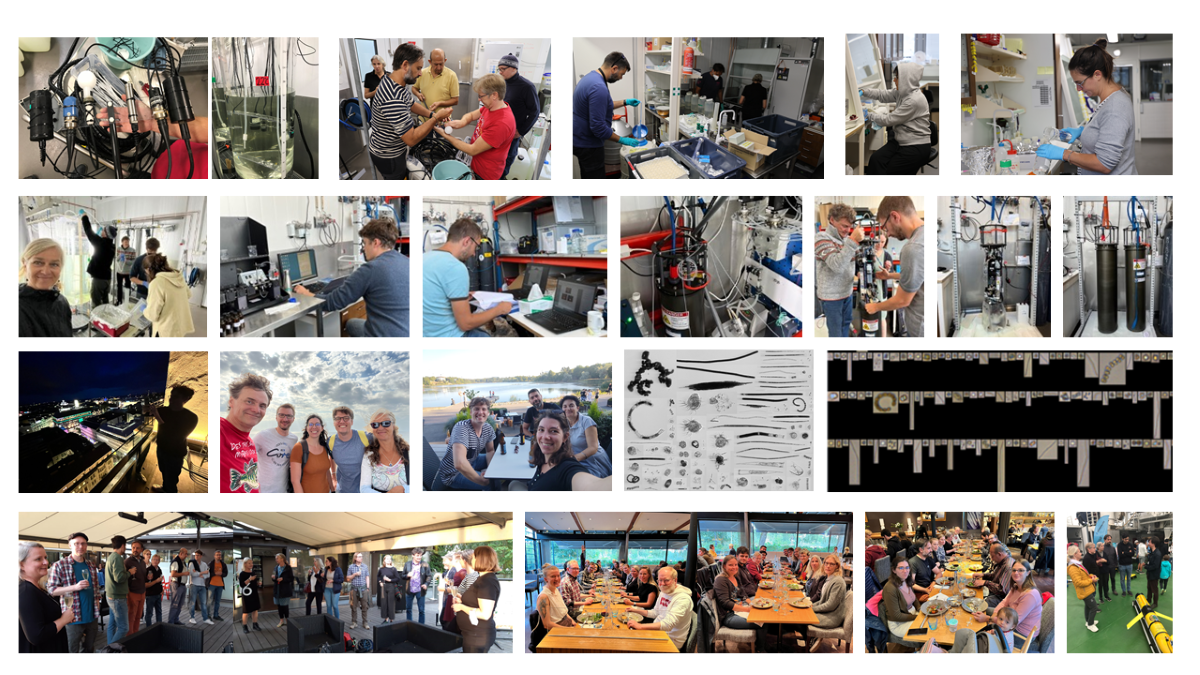Stella Berger, Christian Dilewski, Alexis Guislain, Iordanis Magiopoulos, Sébastien Mas, Behzad Mostajir, Jens Nejstgaard, David Parin, Paraskevi Pitta, Tanguy Soulié, Katerina Symiakaki, Anastasia Tsiola, Francesca Vidussi
During a Transnational Access of JERICO-S3, called the ‘Joint JERICO-S3 and AQUACOSM-plus study on Baltic Sea heatwaves‘, twelve indoor mesocosms were used to simulate different levels of MHWs at the Finnish Environment Institute (SYKE) in Helsinki from late August to early September 2022, in order to study their impact on the Baltic Sea plankton communities.
Severe anomalous warming events, known as Marine Heat Waves (MHWs), are expected to increase under continued global warming. Although the effect of the temperature increase has been investigated in multiple systems, little is known about the response of plankton communities to Marine Heat Waves (MHV). MHVs are expected to be a major driver of aquatic ecosystems and can modify the interactions between different groups of plankton and shift the structure and functioning of the community, sometimes to an irreversible level.
Five scientists from the Leibniz Institute of Freshwater Ecology and Inland Fisheries IGB (Germany), three scientists from the Hellenic Centre for Marine Research HCMR (Greece) and five scientists from the National Centre for Scientific Research CNRS (France), all benefitting from the Transnational Access support of JERICO-S3, participated in this mesocosm experiment in collaboration with more than fifteen scientists of the host laboratory SYKE.

Several physical, chemical and biological variables were monitored for 10 days using various high-frequency sensors, image-based analysis instrumentation and discrete water sampling from mesocosms to estimate the metabolic changes of plankton communities, to identify planktonic species and traits, their abundances and biomasses, and interactions between organisms. As a collaborative team of experts, we could follow the physicochemical environment and the dynamics of planktonic organisms from viruses to zooplankton under different temperature treatments simulating heat waves. In addition, we studied the response of the in-situ microbial and plankton communities to temperature changes, during the warm period of 2022, through regular samplings at the same geographical area from which the mesocosm water was collected.
This great and fruitful collaboration underlines the scientific gain of combination between the experimentation realised in the mesocosms based on the environmental scenarios that come from the observations. This collaboration was a unique opportunity for a common research activity between two state-of-the-art Research Infrastructures, one Experimental-AQUACOSM-plus and one Observational-JERICO-S3. We expect to compare and combine the findings from both, the mesocosm experiment and the in-situ samplings with an aim to develop a more complete picture of the effects of Marine Heat Waves on the planktonic communities and related ecosystem functions of the Baltic Sea. We expect that these results will have relevance for a wider range of planktonic systems under temperature stress, especially in other boreal and temperate areas, where the strongest effects of seasonally increased temperatures have been shown for e.g. terrestrial systems.
